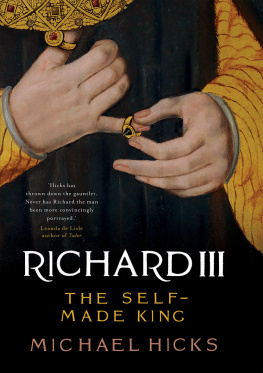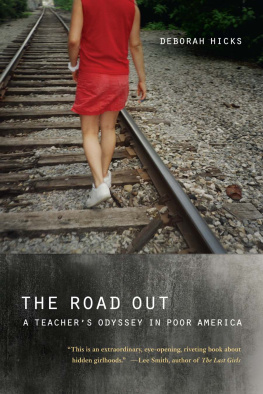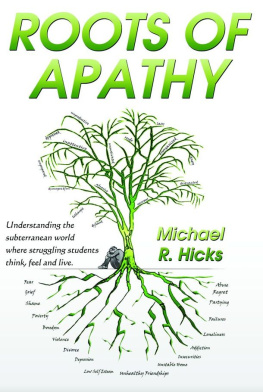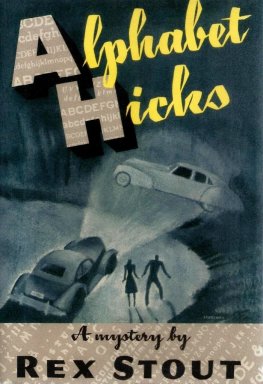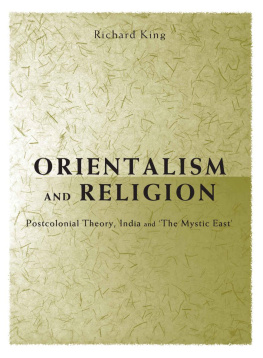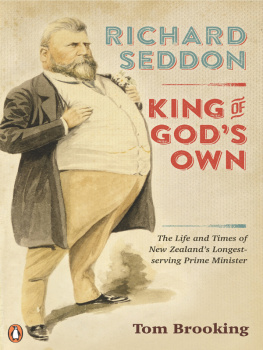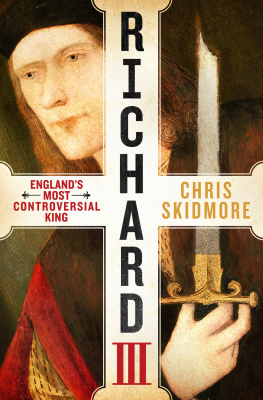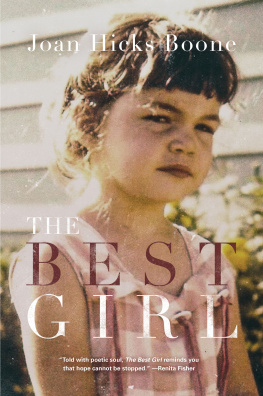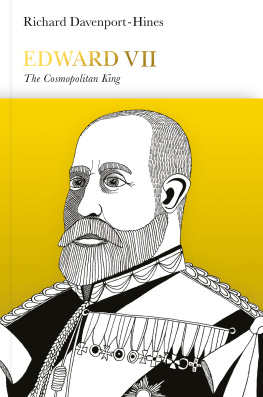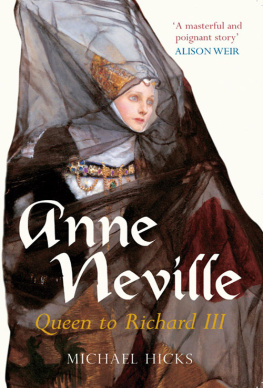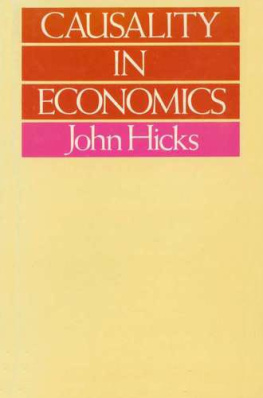Hicks - Richard III : The Self-made King
Here you can read online Hicks - Richard III : The Self-made King full text of the book (entire story) in english for free. Download pdf and epub, get meaning, cover and reviews about this ebook. year: 2019, publisher: Yale University Press, genre: Art. Description of the work, (preface) as well as reviews are available. Best literature library LitArk.com created for fans of good reading and offers a wide selection of genres:
Romance novel
Science fiction
Adventure
Detective
Science
History
Home and family
Prose
Art
Politics
Computer
Non-fiction
Religion
Business
Children
Humor
Choose a favorite category and find really read worthwhile books. Enjoy immersion in the world of imagination, feel the emotions of the characters or learn something new for yourself, make an fascinating discovery.
Richard III : The Self-made King: summary, description and annotation
We offer to read an annotation, description, summary or preface (depends on what the author of the book "Richard III : The Self-made King" wrote himself). If you haven't found the necessary information about the book — write in the comments, we will try to find it.
Richard III : The Self-made King — read online for free the complete book (whole text) full work
Below is the text of the book, divided by pages. System saving the place of the last page read, allows you to conveniently read the book "Richard III : The Self-made King" online for free, without having to search again every time where you left off. Put a bookmark, and you can go to the page where you finished reading at any time.
Font size:
Interval:
Bookmark:
RICHARD III
Also in the Yale English Monarchs Series
THELSTAN by Sarah Foot
CNUT THE GREAT by Timothy Bolton
EDWARD THE CONFESSOR by Frank Barlow
WILLIAM THE CONQUEROR by David Bates
WILLIAM RUFUS by Frank Barlow
HENRY I by Warren Hollister
KING STEPHEN by Edmund King
HENRY II by W. L. Warren
RICHARD I by John Gillingham
KING JOHN by W. L. Warren*
EDWARD I by Michael Prestwich
EDWARD II by Seymour Phillips
EDWARD III by W. M. Ormrod
RICHARD II by Nigel Saul
HENRY IV by Chris Given-Wilson
HENRY V by Christopher Allmand
HENRY VI by Bertram Wolffe
EDWARD IV by Charles Ross
RICHARD III by Charles Ross
HENRY VII by S. B. Chrimes
HENRY VIII by J. J. Scarisbrick
EDWARD VI by Jennifer Loach
MARY I by John Edwards
JAMES II by John Miller
QUEEN ANNE by Edward Gregg
GEORGE I by Ragnhild Hatton
GEORGE II by Andrew C. Thompson
GEORGE III by Jeremy Black
GEORGE IV by E. A. Smith
Available in the U.S. from University of California Press

Copyright 2019 Michael Hicks
All rights reserved. This book may not be reproduced in whole or in part, in any form (beyond that copying permitted by Sections 107 and 108 of the U.S. Copyright Law and except by reviewers for the public press) without written permission from the publishers.
For information about this and other Yale University Press publications, please contact:
U.S. Office:
Europe Office:
Set in Baskerville by IDSUK (DataConnection) Ltd
Printed in Great Britain by TJ International Ltd, Padstow, Cornwall
Library of Congress Control Number: 2019948596
ISBN 978-0-300-21429-1
A catalogue record for this book is available from the British Library.
10 9 8 7 6 5 4 3 2 1
CONTENTS
PREFACE
The 15th century, and especially the Wars of the Roses, is the era of Richard III and the focus of the authors career as a historian. It is almost 50 years since my MA dissertation on Henry Percy, 4th Earl of Northumberland (d. 1489), retainer and rival of Richard III, and only five fewer since my DPhil thesis on George, Duke of Clarence (d. 1478), Richards brother and another rival. A succession of studies of other contemporaries culminated in 1991 in my Rivals of Richard III. I have written about the kings public image (1991, 2000), his father-in-law Warwick the Kingmaker (1998), his eldest brother Edward IV (2004), nephew Edward V (2003), consort Anne Neville (2005), and his whole family (2015). All interacted with Richard III and hence all contributed step by step to my understanding of the duke and king. Approaching him from so many directions has forced me to revise and correct earlier publications by myself and others and, I hope, to improve my understanding. Inevitably this book revisits many aspects and inevitably it supplements and corrects what I have written before. I have learnt a lot in the writing. I hope that this history is better too.
Three principles have shaped this book. First of all, Richard was a 15th-century nobleman (magnate) and needs to be treated as such, in the tradition of the great Oxford historian K.B. McFarlane (d. 1966). McFarlane taught his students to locate such men in the many contexts within which they were brought up: political, national and local, military, religious, and much else. Richard knew the standards shared by his peers and society more generally and catered for their expectations, albeit also often flouting them. Since such great men were landholders and dynasts, it is necessary to research and understand their estates, income and expenditure, public office, and retainers. It was by retaining men that magnates made themselves powerful: their power, known as bastard feudalism, could be abused. This book is therefore a biography of a great nobleman and indeed a royal prince who unexpectedly became a king and brought to this new role the outlook and experience of his former life. Henry IV and Edward IV are parallels. Richard sought advice and delegated to staff, but he was also, it seems to me, the author of his key decisions and actions.
Second, Richard lived for 32 years, only two of them as king. He had a career and personal life 30 years long before he became king. It was during those years that he grew up, absorbed beliefs, principles, values, morals, and prejudices, and shaped the outlook and conduct that he brought to monarchy. He was an aristocrat like the other aristocrats of his time, unusual because he had neither the inheritance of an heir nor the limited expectations of a younger son, and remarkable because of the strategic visions that he made into realities. A mature man does not change his whole character when he becomes king. Richard brought to his kingship the ideology, experiences, and modes of operation that he had developed as a duke, although now actuated by a heightened sense of dignity, an impatience of opposition, and a ruthlessness no longer fettered by others. This book therefore devotes exceptional space to Richards life as duke and seeks to draw out the continuities in his behaviour before and after 1483.
Third, therefore, this is not a study of Richards life and times, still less the comprehensive and rounded analysis of the reign that Charles Ross achieved, nor indeed a pre-history of the Tudors. It is an account of the formation and activities of Richard the man. It is a more direct biography that deploys all the evidence. That Richards purported bones at Leicester reveal him to have been indeed a hunchback (a sufferer from scoliosis) has rehabilitated a key element of the Tudor legend. It enables this book to employ the testimony of such Tudor writers as the Crowland Continuator, Sir Thomas More, and Polydore Vergil that have been over-disparaged for so long: albeit critically and sceptically.
No biographies of medieval English kings are more indebted to the works of others than those of Richard III. My footsteps have been guided by my supervisors John Armstrong, who so splendidly edited Mancinis Usurpation of Richard III, T.B. Pugh, and Charles Ross and by their publications. I have often been grateful to such 19th- and early 20th-century historians as Sir Henry Ellis, James Gairdner, Charles Kingsford, James Raine the elder and younger, and Cora L. Scofield; to the excellent modern editions of sources by Armstrong, Lorraine Attreed, Joseph Bain, Barrie Dobson, Chris Given-Wilson, Peter Hammond, Rosemary Horrox, Nicholas Pronay, Anne Sutton, Richard Sylvester, and Livia Visser-Fuchs; to the ground-breaking studies of Alec Myers, Paul Murray Kendall, Ralph Griffiths, Horrox again, Louise Gill, and Tony Pollard; and to the literally hundreds of articles and notes published mainly in the Ricardian, the journal of the Richard III Society. Historians both professional and amateur have explored so many topics often overlooked, such as Richards coronation and library, and have left every future biographer in their debt. A new generation of Ricardians has already emerged. My research students, especially Gordon McKelvie and Alex Brondarbit, have also played their part. There are too many historical and fictional works that touch on Richard III for anyone to read them all and to extract all the nuggets of originality that they contain. The foundation for modern study remains Charles Rosss Richard III, now almost 40 years old, but still fundamental and not superseded here. The present book does not engage in detail with Rosss work or strive to correct, applaud, or update everything he wrote. Crucial though the narrative sources are, this book makes much of the documents that record actions at the time and often enough those of Richard himself. The author gratefully acknowledges his debts to those before him who are too numerous to itemise individually.
Next pageFont size:
Interval:
Bookmark:
Similar books «Richard III : The Self-made King»
Look at similar books to Richard III : The Self-made King. We have selected literature similar in name and meaning in the hope of providing readers with more options to find new, interesting, not yet read works.
Discussion, reviews of the book Richard III : The Self-made King and just readers' own opinions. Leave your comments, write what you think about the work, its meaning or the main characters. Specify what exactly you liked and what you didn't like, and why you think so.

